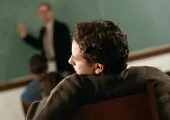Study found more texting lined up with less high-quality slumber
HealthDay – Not on Site

By Alan Mozes
HealthDay Reporter
FRIDAY, Oct. 18 (HealthDay News) -- College students in search of a good night's sleep may want to put some distance between their pillow and their cell phone, new research suggests.
However, study author Karla Klein Murdock, a professor of psychology at Washington and Lee University in Lexington, Va., took pains to make clear that her work does not draw a direct cause-and-effect between more texting and worse sleep, only an apparent association.
But the research did reveal that whether or not a student was experiencing stress, greater texting frequency correlated with key indicators of sleep trouble. That, she noted, took the form of sleeping less, taking longer to fall asleep, spending less time actually sleeping while in bed, experiencing disturbances throughout the night and/or feeling tired during the day.
What's more, among students for whom stress is an issue, frequent texting appears to make things worse, ultimately undermining their overall sense of emotional well-being and contributing to a higher risk for burnout.
"In other words, high levels of texting may exacerbate the negative psychological effects of stress," Murdock said.
At the same time, "sleep problems," she added, "may occur because students continue to use their cellphones at night, which pushes bedtime later and/or makes it difficult to fall asleep right away. Also, students may be awakened in the middle of the night when an incoming message makes their cellphone ring, buzz or light up."
Murdock reported her findings in a recent issue of the journal Psychology of Popular Media.
Considerable prior research (including a 2007 survey by the American College Health Association) suggests that many college students are significantly sleep-deprived, Murdock noted.
To explore texting's potential role in contributing to sleep disturbance and stress, Murdock focused on the texting habits of 83 first-year students (roughly two-thirds female) who were attending what she describes as a "rigorous, southeastern liberal college."
Three-quarters were white, and all were between the ages of 18 and 21.
In addition to asking the students to report their average daily texting routine, all underwent a battery of tests to assess their stress levels; the degree to which they had experienced academic and/or social burnout; and their emotional well-being as reflected in how happy, satisfied and interested in life they had felt over the prior month.
As well, all underwent standard assessments for sleep quality and signs of sleep disturbances.
The result: Higher daily texting lined up with poorer sleep, perhaps because students felt compelled to respond to incoming texts, no matter the time of day, Murdock said.
In addition, heavier texting activity was also associated with increased difficulties in coping with stress for those already experiencing it. And although the study did not specifically set out to examine the reasons for this, Murdock suggested that the lack of nuance, context and key visual cues that typifies texting could account for the increased vulnerability to stress that the activity appears to prompt.
source : Too Much Texting May Leave College Kids Sleepy








